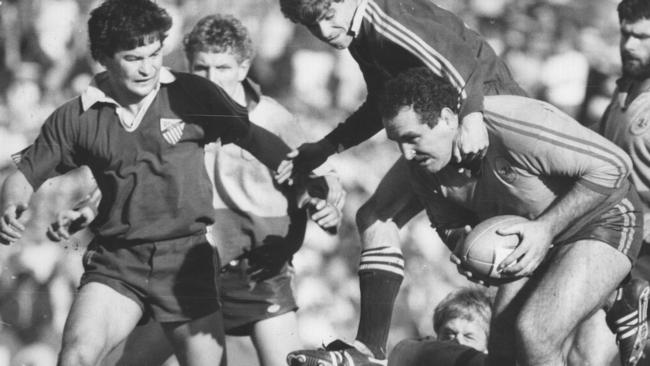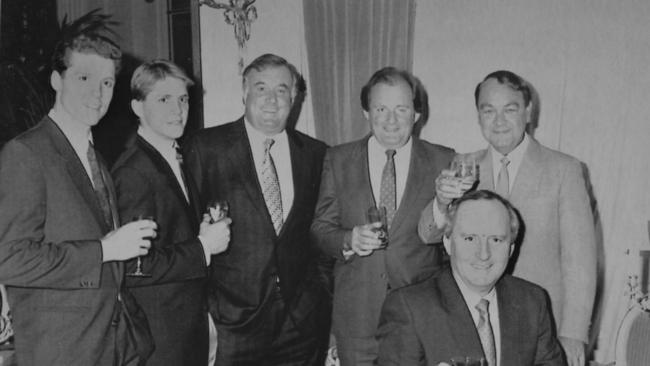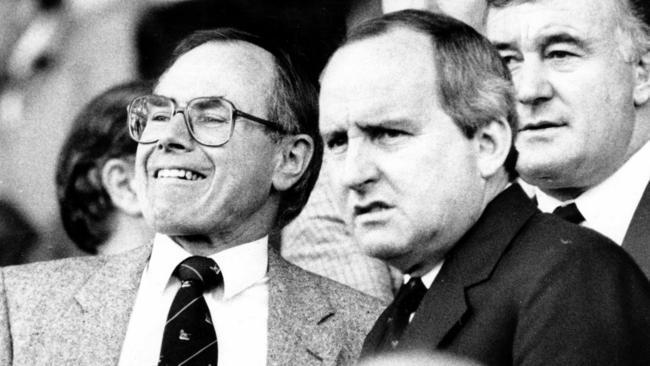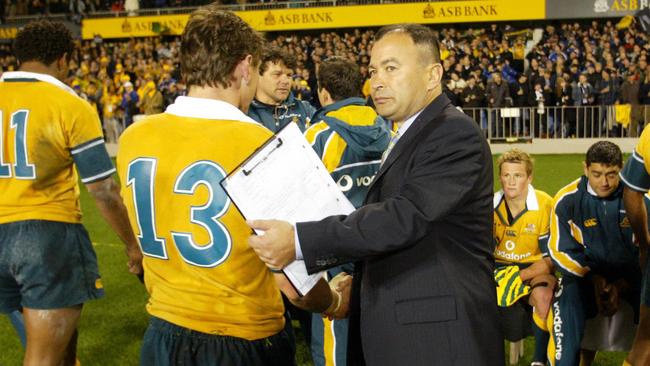IN his new book Eddie Jones: Rugby Maverick, Mike Colman lifts the lid on one of Australian rugby’s worst kept secrets – the shocking sledge that sparked a 30-year feud between two of the game’s biggest personalities.
ON most occasions any angst caused by Eddie Jones’ on-field verbal sprays was forgotten once the fulltime whistle sounded, although it would be fair to say he was not popular amongst players from other clubs, who labelled him a ‘pest’.
But on one notable occasion the barb was not forgotten over a beer. Not the night after the game. Not ever. One day he finally went too far.
He sledged the wrong player.

By 1988 the reign of Alan Jones as Wallabies coach had come to an end. Following enormous success in which the team had completed a Grand Slam tour of the UK and beaten the All Blacks in New Zealand, an unsuccessful World Cup and unhappy tour of Argentina had seen cracks appear. Some in the squad had become increasingly frustrated at their coach’s perceived favouritism of certain players.
One of these was Brian Smith.
● EMBARRASSED: Wales end Wallabies dominance
● TWICKENHAM DRAMA: All Blacks hold on against England
A precociously talented 20-year-old, Queenslander Smith was the latest in a long list of players for whom Jones prophesised greatness, and then did everything in his power to make that happen.
To the chosen ones, the support of Jones was an invaluable boost to their careers both on and off the field. He was a sport and life coach whose patronage and loyalty was appreciated and reciprocated.
Those outside the Jones inner circle saw his closeness to certain players as a means to diminish his reputation and influence.

“As to playing favourites, it was the first question I was asked when I became coach: ‘Will you be favouring people?’ because my predecessor Bob Dwyer had favoured Randwick players,” Jones says.
“I said I would. I’d be favouring the best. I believe Brian Smith was gifted and capable of playing in any position. His subsequent record speaks for itself.”
After the Argentina tour, which would prove the nadir of Jones’ Wallaby tenure, Smith moved from Brisbane to Sydney to further his career. It was there, in a club match against Randwick that he found himself in Eddie Jones’ sights.
As Smith lined up a kick at goal Eddie did what he had done to dozens of opponents over the years: he gave him an unrelenting verbal spray.
Zeroing in on Smith’s closeness to Alan Jones, as the Randwick players stood behind the goal line, he launched a torrent of insults and graphic innuendo.

On it went, from the time Smith stepped up to take the kick, through placing the ball on the mound, pacing out his run-up and moving in, Eddie didn’t let up.
The kick taken, Eddie followed Smith back to the halfway line, never stopping the abuse for a moment.
What Eddie didn’t realise was that standing behind the fence, listening to every word, was Alan Jones.
Jones has an expression for those who are loyal to him and to whom, in return, he is equally loyal. He calls them the “Pick and Stick Club”.
Members of that select band know just what a valuable friend he can be. Whether it be Wallaby jerseys, entry into Oxford, help with property purchases or employment opportunities, Alan has the means and influence to make things happen. Likewise, those who have offended Jones in some way and earnt his enmity – from Prime Ministers down – will attest that he can be a very powerful enemy.
That day at a suburban rugby ground in Sydney, Eddie joined the second group.
Some would say he captained it.
Alan Jones would never forget what was said by the little man in green. Whether on the air, speaking to his supporters within the rugby hierarchy or in the private letters he would regularly send to influential friends, he wouldn’t miss an opportunity to voice his lack of regard for Eddie’s coaching ability and personal qualities.

“Eddie Jones, when it suited him, could be the master of filth, in particular filthy language,’” Jones says.
“I learned that day the character of the man. And it’s something with which I can’t and won’t identify.”
Eddie, typically, remains unrepentant.
“It’s true. It didn’t make me popular with Alan. Actually I find it funny that he still carries a grudge. I’ve spoken to him once in my life. It did happen, but that was club rugby in those days. I admit I was a good sledger. Probably a better sledger than I was a player,” Eddie says.
Whether it was part of the game or not, Alan Jones would never forgive or forget, especially when Eddie became national coach.
In 2003, when the Wallabies were beaten 50-21 by the All Blacks in Sydney, Alan Jones unleashed during a regular TV spot.
“The Wallabies have problems but they are not player problems, they are coaching problems. Sometimes what the coach says borders on the indecipherable. God only knows how the players work out what he means. Sometimes it’s better to be not coached than badly coached. Australian rugby is full of talented players. Our talent is being betrayed. The real tragedy is that Eddie Jones, the unsuccessful coach, has the permeating influence right throughout Australian rugby.”

The onslaught quietened down somewhat with the Wallabies success in reading the final of the 2003 World Cup but began to build over the next two years, reaching a crescendo after an embarrassing loss to England.
“What on earth does this man do for the money he is paid?” Alan Jones asked on his radio show.
“We have outstanding players. We are smack bang in the middle of a leadership that can’t adjust to the modern demands, a leadership that can’t co-ordinate the team to meet the challenge offered on the other side.”
Finally, after eight losses, ARU boss Gary Flowers called Eddie into his office and told him he was sacked.
Eddie told reporters he had no hard feelings towards Flowers or the ARU.
Who he did blame, however, was Alan Jones.
Alluding to his sledging of Smith over 20 years earlier, he said, “Ever since I took on the job he’s been trying to get me out. Alan and I had a disagreement when I was a player and he was a coach but that’s a long time ago.”

Alan Jones stands by his criticism of Eddie’s coaching of the Wallabies, but rejects claims that he had plotted his dismissal from the start.
“When he got the job, I congratulated him and indicated I would give him my support but I believe his obsession with the pick and drive has ruined the game and Australia cannot regain pre-eminence in world rugby until we change the way we play,” he says.
“When it falls apart with Eddie Jones, it falls apart. And the results always bear witness to that. I suspect that in recent years he’s mellowed a little. He would need to. As to whether or not my commentary cost him his job as Australian coach I have profound doubts. The scoreboard and the players cost Eddie Jones his job. The argument that I’d been trying to get rid of him was a product of Eddie’s imagination.”
Gary Flowers agrees, saying the ongoing criticism by Jones had no influence on his decision to terminate Eddie’s contract.
“Alan was just another voice in a wall of disquiet about Eddie’s performance. The results were poor, there’s no way around that, but to be honest that wasn’t the only factor. It was clear to me that he had to go. In some respects the results just made it easier.”
The unauthorised biography Eddie Jones: Rugby Maverick by The Courier-Mail journalist Mike Colman was launched in London last week and will be available in Australia from November 12.


Add your comment to this story
To join the conversation, please log in. Don't have an account? Register
Join the conversation, you are commenting as Logout
103 years: Depths of MCG despair laid bare as Wallabies vow to fight
A shattered Wallabies side has declared they will not allow the Lions to leave with a 3-0 clean sweep after officially giving up their biggest lead in a century to lose the second Test.
GPS First XV rugby: Rd 2 team of the week features BSHS Trojans
GPS First XV rugby: The latest team of the week features a BSHS carbon copy of Trent Picot, a Fantastic Five from BBC, outstanding IGS forwards and Terrace’s Mr Reliables. More here.